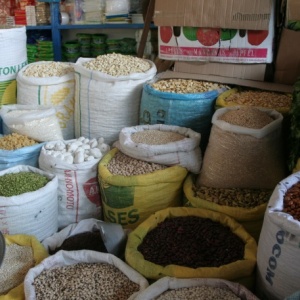
This International Institute for Environment and Development (IIED) report looks into the dilemma facing developing countries and emerging economies in deciding whether they should favour local over global food chains.
Using case studies from Senegal and Peru this paper shows a new and complex reality that challenges ideological views about re-localising food production and consumption. It analyses national policies and food chain practices of increasingly globalised markets, and shows that in both countries local food chains are complementary rather than an alternative to imported food.
The researchers argue that changing the inquiry from ‘how can we feed the world?’ to how people actually feed themselves or wish to be fed, brings new perspectives into the debate. This has important implications for policies and business interventions, one example being that a new and often overlooked issue is coming to the fore: changes in consumers’ behaviour associated with urbanisation and new aspirations.
Senegal and Peru are shown in this report to both support local food chains through diverse market mechanisms (import regulations, promotion of gastronomy and local diets) while at the same time supporting agro-export diversification in new products and new market destinations. And the authors describe how changes in domestic consumption, business and policy are contributing to reshaping global trade. Trade agreements reflect the new strategies of governments in the global South of trying to develop through mixed strategies for both local and global chains, to ensure both economic growth and food security for their people.
The paper analyses levels of export and import dependencies of both countries and looks at consumer preferences as well as how the two countries try to strike a policy balance between economic growth, food security and sustainability. The authors argue that the challenge now is to improve national food market governance and the performance and sustainability of both local and global food chains.
Note however that there is no explicit chapter looking at the sustainability implications of local versus global food chains – some more critical discussion can be found in other studies such as this and this.
Abstract
Is it possible to re-localise food production and consumption? ‘Old’ market destinations are losing out in favour of new emerging markets. From being simple ‘policy takers’ developing and emerging economy countries are gaining sovereignty and becoming ‘policy makers’ – helping to reshape food systems and the geopolitics of food trade. Using case studies from Senegal and Peru, this paper examines whether local or global food chains are better at delivering food security and safety, decent employment, protecting the environment and contributing to economic growth.
Both countries import and export food and feed. Both face policy dilemmas and are rethinking business interventions, juggling national food security, economic growth and international trade agreements while satisfying growing domestic and regional demands and new consumers’ aspirations.
Citation
del Pozo-Vergnes, E. and Vorley, B., (2015). Global or local food chains? Uncovering the dilemmas in Senegal and Peru , IIED Issue Paper. IIED, London.
Read the full report here.
See more resources related to economy, trade, markets, local food, governance and policy, food and agriculture policy.







Post a new comment »